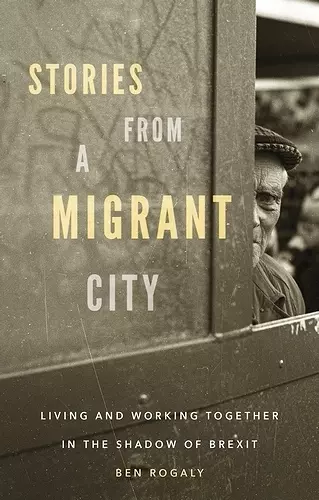Stories from a Migrant City
Living and Working Together in the Shadow of Brexit
Format:Paperback
Publisher:Manchester University Press
Published:13th Mar '20
Currently unavailable, and unfortunately no date known when it will be back

This book intervenes in the immigration debate, showing how moving away from a racialized local/ migrant dichotomy can help to unite people on the basis of their common humanity. Drawing on over one hundred stories and eight years of research in a provincial English city, Rogaly asks what that city (and indeed England as a whole) stands for in the Brexit era. Stories from the city’s homes and streets, and from its warehouse and food factory workplaces, challenge middle-class condescension towards working-class cultures. They also reveal a non-elite cosmopolitanism, which contrasts with the more familiar association of cosmopolitanism with elites. The book combines critique with resources for hope. It is aimed at general readers as well as students and lecturers in geography, sociology, migration studies and oral history.
'Stories from a migrant city is a beautifully written book mapping the consolidation of a complex culture of multi-ethnic working class cosmopolitanism amid the rise of reactionary populisms.
Drawing on a decade of painstaking research on local workplaces and neighbourhoods, Rogaly uncovers the shared histories of mobility and fixity as well as how they continue to be disrupted by class inequalities and racisms. He should be applauded for not only producing an analytically sophisticated book but one which provides us with some of the resources of hope that might one day help to plot a path towards a more open and democratic future for all.'
Professor Satnam Virdee, University of Glasgow
'A powerful, thoughtful and much needed contribution'
Fatima Manji, Correspondent, Channel 4 News
'In the face of the most ugly uses of ‘place’ as a code for racialised exclusivity, this poignant and necessary book encourages us to think more expansively - of varieties of inclusion and exclusion, of unexpected conviviality and cosmopolitanism from below, of tactics of racial capitalism that set us against each other and spaces of imagination that can bring us together. All in the form of a kind of love-song to... Peterborough.'
Professor Gargi Bhattacharyya, University of East London
'In this extraordinary book Ben Rogaly shows us that we need to rethink who is considered a ‘migrant’ and who is a ‘local.’ The urgent lesson contained in these pages is that any step towards challenging the racism that distorts and confines the immigration debate needs to listen out for what is emerging in the ordinary life of cosmopolitanism from the bottom-up.'
Professor Les Back, Goldsmiths, University of London
'Ben Rogaly succeeds in dissolving the distinction between ‘local’ and ‘migrant’ to illuminate everyday forms of working-class multicultural interaction and conviviality. A ‘must-read’ book in an age of Brexit uncertainty, changing global macro-economic processes and the rise of nationalist nostalgia.'
Professor Anoop Nayak, Newcastle University
'This book is for anyone interested in British identity. You don’t need to have spent your Saturdays as a teenager hanging around the Queensgate shopping centre to find it informative and compelling. But Rogaly also resists using the city merely as a way to explain something bigger, as a stand-in for other provincial places.
In Stories From a Migrant City, Peterborough exists, in and of itself, as a distinct place. We need more books that do the same for other cities and towns in the United Kingdom and elsewhere in the world.'
Charlotte L. Riley, New Humanist
'Rogaly’s Stories from a Migrant City challenges contemporary understandings of immigrant inclusion and exclusion and xenophobic antipathy in the aftermath of Brexit. Rogaly (Univ. of Sussex, UK) criticizes common analyses of Brexit as a clash between open-minded, cosmopolitan elites and racist, native-born, working-class whites. Instead, using a politics of place in Peterborough (a small, provincial city outside of London), coupled with illuminating oral history data drawn from "locals," "newcomers," "immigrants," and "elites," he reveals that the politics that put Brexit into play are more complicated than the superficial images presented in the media and in much academic discourse. Rogaly demonstrates that cosmopolitanism is regularly practiced in the everyday lives of Peterborough’s working- and middle-class inhabitants. Late-stage capitalism and neoliberalism have put everything in flux so that the terms "native" and "migrant" do not adequately reflect who lives in Britain and whose "authentic" British lifestyle is at stake from the promises and threats of Brexit. Disruption of continuity of place magnifies changes, making them seem more threatening to the national and local projects. Rogaly provides glimmers of hope highlighting historical moments of opportunities for unity.
--R. A. Harper, York College
Summing Up: Highly recommended. Lower-division undergraduates through faculty; professionals.
Reprinted with permission from Choice Reviews. All rights reserved. Copyright by the American Library Association.
ISBN: 9781526131737
Dimensions: 216mm x 138mm x 14mm
Weight: unknown
248 pages